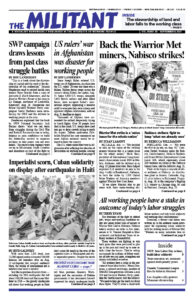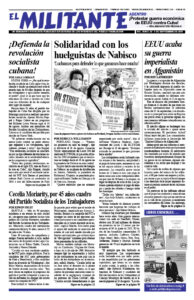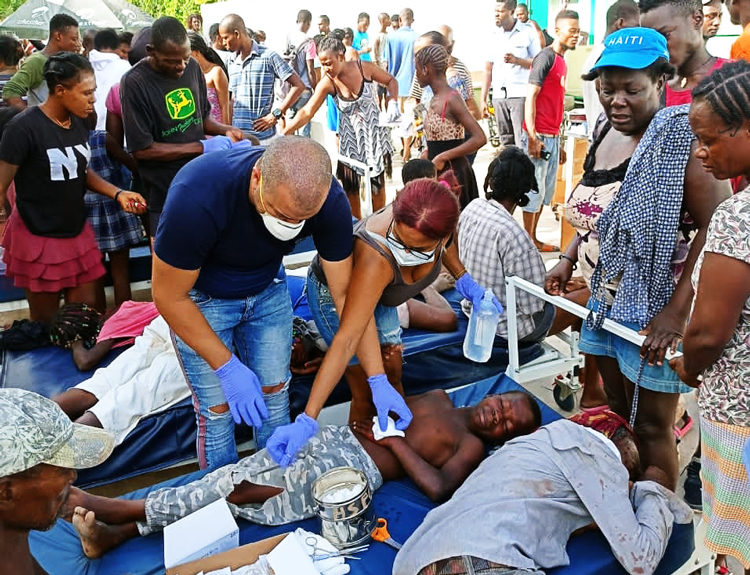With more than 2,100 dead, over 12,000 injured and an estimated 136,000 families left homeless after an Aug. 14 earthquake that ravaged southwest Haiti, the trickle of international aid is nowhere near what is needed.
Just like in previous disasters there — including the 2010 earthquake that left about 300,000 dead and Hurricane Matthew in 2016 — the grossly inadequate aid shows that working people in Haiti don’t count for much in the eyes of the capitalist rulers in Washington and other imperialist powers. Despite the death toll from previous disasters, Washington and the succession of Haitian governments it has dominated haven’t improved the utterly inadequate health care available on the island.
The sharp exception is the internationalist aid from revolutionary Cuba, whose medical workers have provided care and health education in Haiti continuously since 1998, when it sent 350 volunteers in the wake of Hurricanes George and Mitch. To combat the spread of cholera introduced in Haiti by U.N. troops in 2010, the Cuban health care workers went house to house in the most isolated mountain regions, educating people about the necessary measures to prevent the spread of the disease.
Among thousands of Cuban medical volunteers providing health care all over the world, there are currently 253 doctors, nurses and other medical workers in Haiti, who will remain there as long as they are needed. This is a significant contribution in a country where there are at best 2,500 doctors, most in private practice and concentrated in wealthier neighborhoods.
Cuban internationalist medical workers already in the hardest hit earthquake zone began setting up makeshift hospitals and operating rooms. At the same time, they continue treating and aiding people across the country. Some of the volunteers are “sleeping in tents, like the more than 130,000 families who lost everything on Aug. 14,” reported Trabajadores, the weekly newspaper of the Central Organization of Cuban Workers.
For the last 22 years, these medical volunteers have collaborated closely with their Haitian colleagues and working people, including giving classes in the health centers and individual homes to raise consciousness about preventive medicine and sanitation.
Proud of Cuba’s socialist revolution
While the Cuban volunteers are scrupulous about not interfering in the internal politics in Haiti, they are proud of representing their socialist revolution.
We are “showing in practice the values of solidarity and humanism that the heroic guerrilla Ernesto Che Guevara has bequeathed to us,” reads a post on the Facebook page of Cuba’s mission in Haiti. Guevara was part of the Marxist leadership in Cuba that led workers and farmers to take power and subsequently served on internationalist missions to Congo and Bolivia.
The U.S. rulers and other opponents of the Cuban Revolution have been trying to stir up divisions in Cuba over the challenge the revolution faces in the midst of the COVID-19 pandemic and the tightening of the U.S. embargo. It’s a struggle for Cuba to get raw materials and syringes it needs to produce and administer its own vaccines.
Despite these obstacles, the Cuban government reported Aug. 24 it has now obtained supplies needed to inoculate everyone on the island and expects to have done so by the end of November.
“You are keeping medical brigades in other countries, as if there were doctors and medicine to spare” in Cuba, complained the editors of CiberCuba, a Spanish-based website, Aug. 23. “Everything is for propaganda, isn’t it?”
These counterrevolutionaries, who defend the dog-eat-dog morality of the capitalist market, are incapable of understanding that such solidarity is not “for propaganda,” but is in fact a product of working-class values that are the bedrock of a living socialist revolution. “We don’t offer what we have left over,” Cuban volunteers often explain. “We share what we have.”
What a difference from the so-called nonprofits, nongovernmental agencies and private companies that use the disaster in Haiti ostensibly to provide aid, but in fact to legitimize their operations and line their own pockets.
Working-class solidarity
In addition to the aid from the Cubans, workers and farmers in Haiti have turned to each other’s solidarity to get through the current crisis. “I have a friend who came from Port-au-Prince to bring me water and food and I shared that with my neighbors,” Marcel Francois told the press.
Dominican journalist Deisy Toussaint, who traveled by land from Port-au-Prince to Les Cayes, told channel 24 TV that she saw areas with homes totally destroyed, where five days after the quake no aid or rescue crews had arrived. “People told us they could hear people still alive under the rubble, and all they had were their hands to try to get them out.”
In the absence of any serious government response to the disaster, a handful of recent graduates from Haiti’s public medical school pooled their money for supplies and set up a clinic in Marceline.
More than 100 years of U.S. imperialist domination and superexploitation are perpetuating the miserable conditions working people confront in Haiti, ensuring natural disasters rapidly become social catastrophes.


